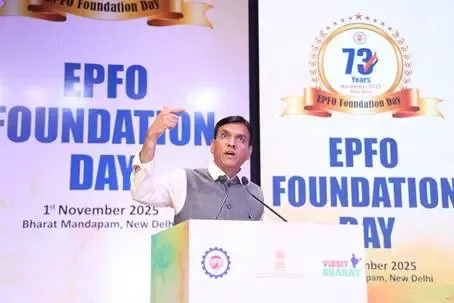What is India’s fiscal deficit for April-Sep?

Synopsis
Key Takeaways
- Fiscal deficit for April-September is Rs 5.73 lakh crore.
- Accounts for 36.5% of the annual budget target.
- Total receipts reached Rs 17.30 lakh crore.
- Government expenditure increased to Rs 23 lakh crore.
- Focus on infrastructure projects is critical for growth.
New Delhi, Oct 31 (NationPress) The fiscal deficit of India for the initial six months of the ongoing financial year (April-September) reached Rs 5.73 lakh crore, accounting for 36.5 percent of the full-year target as outlined in the budget, according to government data released on Friday.
The data indicates that the fiscal deficit is effectively managed, enabling a pathway for stable economic growth.
Total receipts amounted to Rs 17.30 lakh crore, while the overall expenditure during April to September was at Rs 23.03 lakh crore. These figures represent 49.5 percent and 45.5 percent, respectively, of the budget targets set for 2025-26.
Revenue receipts totaled Rs 16.95 lakh crore, with tax revenue accounting for Rs 12.29 lakh crore and non-tax revenue contributing Rs 4.66 lakh crore.
The increase in non-tax revenue is attributed to the Reserve Bank of India approving a dividend of Rs 2.69 lakh crore to the central government, up from Rs 2.11 lakh crore transferred last year, aiding further reduction of the fiscal deficit.
Total government expenditure during the April-September period escalated to Rs 23 lakh crore, compared to Rs 21.1 lakh crore from the same period last year.
This rise reflects heightened government spending on significant infrastructure projects in highways, ports, and railways, which are crucial in stimulating economic growth amid increasing uncertainties due to geopolitical issues and US tariff disputes.
In its latest budget for FY25, the central government has set the fiscal deficit target at 4.9 percent of the gross domestic product (GDP), a decrease from 5.6 percent in the previous fiscal year, which was lower than the revised estimates of 5.8 percent.
A declining fiscal deficit indicates a strengthening of economic fundamentals and lays the groundwork for growth accompanied by price stability. It leads to reduced government borrowing, thus freeing up more funds in the banking sector for loans to businesses and consumers, fostering higher economic growth.
With a robust fiscal position anticipated in 2025-26, the government is expected to have extra leeway to address unforeseen expenditures related to defense, as noted in a recent Bank of Baroda report.
This observation gains significance amidst tensions with Pakistan following the Pahalgam terror attack and Operation Sindoor.









